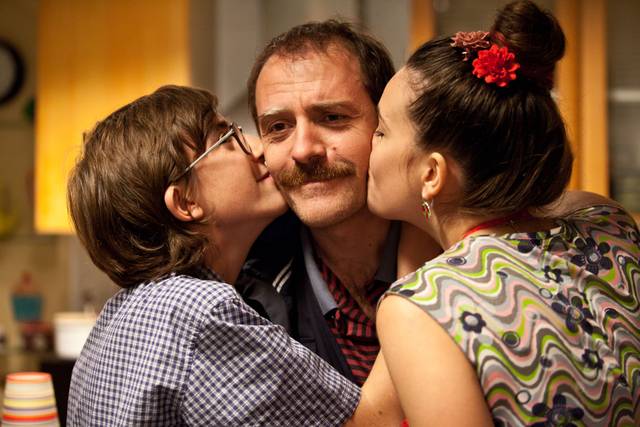 LUCA DIRODI, VALERIO MASTANDREA AND DERENA PINTO IN GARIBALDI'S LOVERSSocial commentary in a comedy that's a tad too whimsical
LUCA DIRODI, VALERIO MASTANDREA AND DERENA PINTO IN GARIBALDI'S LOVERSSocial commentary in a comedy that's a tad too whimsical"The director of 2007’s hard-hitting
Days and Clouds takes a more comedic, though similarly pointed and critical, look at contemporary Italian society with this dual story of a Genoan plumber trying to raise his two kids after the death of his wife and a starving artist who is hoping for a lucrative new commission." So says the blurb. Yes and the skinny, bespectacled son of Leo (Valerio Mastandrea), the plumber, whose name is Elia (Luca Dirodi), has adopted a stork he has named Agostina (he calls her "Aga" for short), that he feeds stolen frogs to because he thinks she's eating polluted food. (Props to the filmmakers for crane-wrangling.) The "starving artist" is Diana (Alba Rohrwacher), who makes repeated appeals to get paid for a job for a bankrupt employer who's taken off by the cops, and then gets a new one to do a mural for a lawyer. Leo's daughter Maddalena (Serena Pinto) has a boyfriend who turns out to be a detective working for the city and investigating real estate fraud. Leo's deceased wife Teresa (Claudia Gerini) isn't completely gone: she appears to Leo in a bikini and rides with him in his truck sometimes.
Going from his winningly whimsical love comedy
Bread and Tulips (2000), which a lot of people saw, and his meandering but interesting 2007 social drama about upper middle class financial woes
Days and Clouds (NIC New York 2008), which not as many saw but also got US distribution and good reviews, through several other films we haven't gotten to see for what may be obvious reasons, Soldini has turned ever more surreal and whimsical-- to the point that this one is so out there it makes you shake your head. The incomprehensible new English title seeks clumsily to make up for the somewhat head-scratching original Italian one, which means "The Commandant and the Crane."
It actually makes sense when you see the m ovie. The Commandant is Garibaldi, the Italian 19th-century liberator, and a statue of him and one of Leonardo and another of the poet Leopardi (voiced successively by Pierfrancesco Favino, Neri Marcorè and Gigio Alberti) occasionally ruminate disapprovingly down upon their northern Italian cityscape when Elia is not running around after his crane, or the pompous landlord, Amanzio (Giuseppe Battiston), who shoplifts expired items from the supermarket, isn't lecturing people, or the starving artist (who's the landlord's tenant) isn't trying to raise her rent, or Leo, who has a Chinese helper called Fiorenzo (Yang Shi), isn't trying to keep his household together. Whether their frantic meanderings justify the noble dead Italians' disapproving generalizations about the sad state of Italy today is hard to say. It's not easy to see any connection, really. There are many indications that Soldini's writing on this film was ill coordinated with that of co-writer Doriana Leondeff (who collaborated on
Bread and Tulips and
Days and Clouds) and Marco Pettenello (who who penned Carlo Mazzacurati's 2010
The Passion).
All this, though good natured, is so flighty, alternatively pretentious, or obviously made-up and silly that it starts to seem a prime example of why these days even Italians aren't going much to Italian movies and apart from exceptions like
Divo and
Gomorrah or this year's
The Great Beauty they unfortunately are only sporadically making it into major festivals other than the ones devoted to Italian movies and co-run by Italian consulates.
Swiss money was contributed for the funding of this picture, which explains why the crane flies off to the German part of Switzerland and has to be retrieved. Amanzio, the pompous, do-nothing landlord, who's quite a kindly sort when he chooses to be, and also a considerable linguist, helps Elia comunicate with the Swiss Germans on the phone, long distance, after the Germans have found Elia's cell phone number around "Aga's" neck. The sets are as willfully elaborate and quirky as the plot line.
Il commandante e la cicogna, 105 mins., was released in Italy 18 Oct. 2012. Screened for this review as part of the New Italian Cinema series of the San Francisco Film Society, Nov. 2012.





